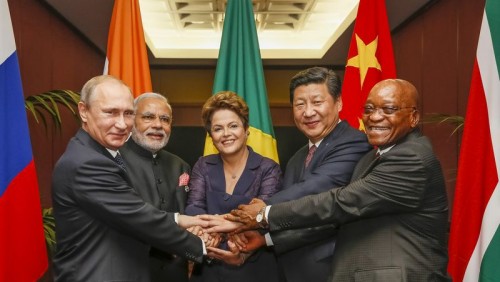Keen to ensure that the China-dominated Asian Infrastructure Investment Bank (AIIB) doesn’t overshadow the BRICS nations-promoted New Development Bank (NDB), New Delhi will hardsell the latter to economic powers.
By: Prasanta Sahu

Keen to ensure that the China-dominated Asian Infrastructure Investment Bank (AIIB) doesn’t overshadow the BRICS nations-promoted New Development Bank (NDB), New Delhi will hardsell the latter to economic powers like the US and Japan as a strategic club to be in. India reckons that the presence of these developed countries would help enhance the NDB’s credit rating, enabling it to raise funds cheap.
While the NDB was essentially India’s brainchild at the 2012 BRICS head of states meeting in New Delhi, China announced at the same time plans to set up AIIB in 2013, which, analysts said, was aimed at increasing its clout in the fast-growing Asian region.
“The NDB could be helped a lot by the US and Japan,” said a source with direct knowledge of developments at the NDB. They added that theUS and Japan should make “a virtue out of this opportunity and back this horse (NDB).” India, they said, was hopeful that all the fence-sitters and AIIB members would also come to the NDB fold to make it a truly global bank.
Unlike in the NDB, where each of the five countries would hold 11% stake each, China would hold around 30% in AIIB and have its way in decision-making. India would hold around 10% in AIIB. The US has stayed out of AIIB citing governance issues. Japan, which plays a bigger role than China in the Asian Development Bank, also decided to stay out of AIIB to protect its interests. The US and Japan, which could together hold 10-12% in the NDB, could get to back India in decision-making, the sources said.
Since then, China has worked at its characteristic breathneck speed, and is poised to sign the final agreement this month with prospective founding members, which include even US allies such as the UK and Germany. Pending final agreement, AIIB has started hiring and identified the building and other infrastructure for the regional infrastructure bank. It is set to start operations later this year.
In contrast, the NDB is yet to kickstart the process of inducting non-BRICS countries as members, who would hold 45% in the bank as per the shareholding plan. As per the agreement among BRICS members of having an Indian as the bank’s first president, India has nominated banker KV Kamath for the job. His name is expected to be ratified at the July meeting of BRICS leaders at Ufa, Russia. Thereafter, work on the building and hiring of personnel and other infrastructure would start.
Sources said there were fears in some circles that China, with its massive forex reserves, would focus on the AIIB and give less attention to NDB.
“Keeping geopolitical interest in mind in the changing environment, when power is shifting to developing from the developed world, it would be in the interest of these two economic superpowers (Japan and the US) to back NDB to make it a success,” said BL Madhukar, secretary general, BRICS Chamber of Commerce and Industry.
While China, with its $4-trillion foreign exchange reserves, could fuel AIIB growth, NDB requires handholding from developed countries to improve its credit profile to be able to raise cheap funds from financial markets. “You need funds in the long run and stronger credibility,” Madhukar said.
Both NDB and AIIB will have an authorised capital of $100 billion. To start with, the NDB would begin with $50-billion subscribed capital, split equally among BRICS countries. It will scale up later by inducting more countries as members and raise resources from the market. India, which needs $1-trillion investment in infrastructure in five years through 2017, could be one of the big beneficiaries of the new institutions.
The NDB, modeled on the lines of the World Bank, is the first such multilateral lender after the Bretton Woods institution was established 71 years ago in 1944.
Reinforcing THE foundation
India reckons that the presence of these developed countries would help enhance the NDB’s credit rating, enabling it to raise funds cheap.
The NDB is yet to kickstart inducting non-BRICS countries as members, who would hold 45% in the bank.
Sources said there were fears in some circles that China, with its massive forex reserves, would focus on the AIIB and give less attention to NDB.
While China, with its $4-trillion forex reserves, could fuel AIIB growth, NDB requires handholding from developed countries to improve its credit profile.